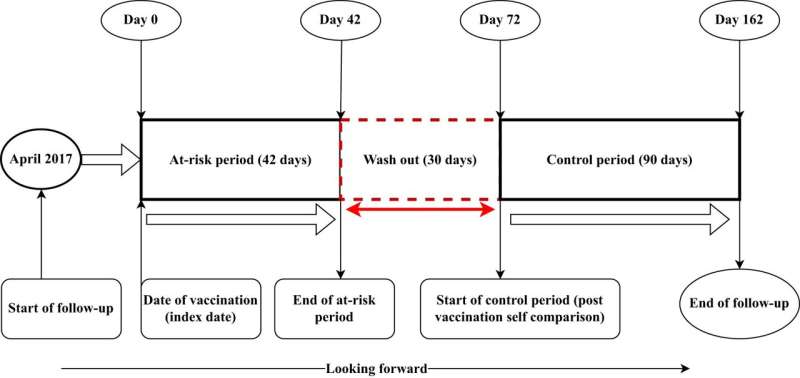This article has been reviewed according to Science X's editorial process and policies. Editors have highlighted the following attributes while ensuring the content's credibility:
fact-checked
peer-reviewed publication
trusted source
proofread
Shingles vaccine reduces risk of stroke and heart attack from virus, study suggests

Getting vaccinated against shingles could significantly reduce the risk of suffering a stroke or heart attack from the virus, a new study published in the journal Nature Communications has found.
Shingles is caused by the same virus, varicella zoster, that causes chicken pox. People who get chicken pox can develop shingles later in life if the virus becomes active again.
"Shingles results in a painful skin rash, but we also know there's an increased risk of having a stroke or heart attack in the first month after the virus is reactivated," said James Mbinta, the study's lead author and a Ph.D. candidate in the School of Health at Te Herenga Waka—Victoria University of Wellington.
The risk of stroke is two to three times higher if the virus reoccurs in the ophthalmic nerve—a sensory nerve in the face.
"The results of our study suggest the shingles vaccine offers a large protective effect against both stroke and heart attack in the first 42 days after vaccination," Mbinta said.
In the study, researchers compared the number of people hospitalized in the first 42 days after getting the shingles vaccine—the 'at-risk' period—with the number hospitalized between 72 and 162 days after vaccination. The latter time frame was used as the 'control' period, which provides a baseline for comparison.
"We found twice as many people (761) were hospitalized in the control period than in the first month following vaccination (321). These results suggest the vaccine may reduce the risk of stroke and heart attack by as much as 50 percent in the first 42 days," Mbinta said.
Results are based on analysis of data from 278,375 adults in New Zealand who got the vaccine between April 2018 and July 2021. Most were aged 70 or older.
Co-author Professor Colin Simpson, an associate dean at the University's Faculty of Health, said the findings add to evidence showing vaccination reduces the chances by ending up in hospital as a result of the virus.
"The results are consistent with research in Australia that found a reduced risk of stroke after vaccination among adults aged 70 to 79," Professor Simpson said.
Previous research led by Mbinta found the shingles vaccine also significantly reduced the risk of being hospitalized with postherpetic neuralgia, a complication of the shingles virus that can cause debilitating pain.
About one in three people will get shingles during their lifetime. The likelihood increases with age. Half of those aged 85 or over are expected to get shingles.
More information: James F. Mbinta et al, Herpes zoster vaccine safety in the Aotearoa New Zealand population: a self-controlled case series study, Nature Communications (2023). DOI: 10.1038/s41467-023-39595-y
















